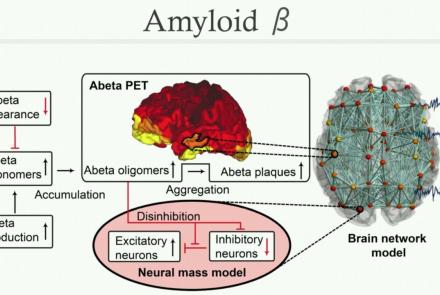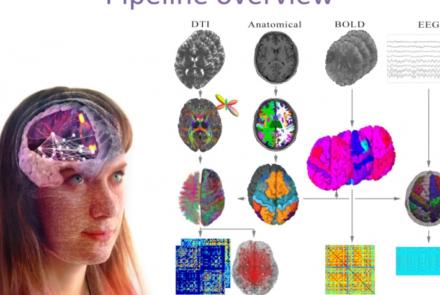In this tutorial, you will learn how to use TVB-NEST toolbox on your local computer.
Difficulty level: Beginner
Duration: 2:16
This tutorial provides instruction on how to perform multi-scale simulation of Alzheimer's disease on The Virtual Brain Simulation Platform.
Difficulty level: Beginner
Duration: 29:08
Course:
This lesson provides a brief overview of the Python programming language, with an emphasis on tools relevant to data scientists.
Difficulty level: Beginner
Duration: 1:16:36
Speaker: : Tal Yarkoni
Course:
An introduction to data management, manipulation, visualization, and analysis for neuroscience. Students will learn scientific programming in Python, and use this to work with example data from areas such as cognitive-behavioral research, single-cell recording, EEG, and structural and functional MRI. Basic signal processing techniques including filtering are covered. The course includes a Jupyter Notebook and video tutorials.
Difficulty level: Beginner
Duration: 1:09:16
Speaker: : Aaron J. Newman
This lesson contains both a lecture and a tutorial component. The lecture (0:00-20:03 of YouTube video) discusses both the need for intersectional approaches in healthcare as well as the impact of neglecting intersectionality in patient populations. The lecture is followed by a practical tutorial in both Python and R on how to assess intersectional bias in datasets. Links to relevant code and data are found below.
Difficulty level: Beginner
Duration: 52:26
Course:
In this lesson, while learning about the need for increased large-scale collaborative science that is transparent in nature, users also are given a tutorial on using Synapse for facilitating reusable and reproducible research.
Difficulty level: Beginner
Duration: 1:15:12
Speaker: : Abhi Pratap
This lecture discusses what defines an integrative approach regarding research and methods, including various study designs and models which are appropriate choices when attempting to bridge data domains; a necessity when whole-person modelling.
Difficulty level: Beginner
Duration: 1:28:14
Speaker: : Dan Felsky
This lecture covers different perspectives on the study of the mental, focusing on the difference between Mind and Brain.
Difficulty level: Beginner
Duration: 1:16:30
Speaker: : Paul F.M.J. Verschure
This lecture covers a lot of post-war developments in the science of the mind, focusing first on the cognitive revolution, and concluding with living machines.
Difficulty level: Beginner
Duration: 2:24:35
Speaker: : Paul F.M.J. Verschure
This lesson discusses both state-of-the-art detection and prevention schema in working with neurodegenerative diseases.
Difficulty level: Beginner
Duration: 1:02:29
Speaker: : Nir Giladi
This lecture provides an overview of depression (epidemiology and course of the disorder), clinical presentation, somatic co-morbidity, and treatment options.
Difficulty level: Beginner
Duration: 37:51
Speaker: : Barbara Sperner-Unterweger
Course:
This lesson gives an introduction to simple spiking neuron models.
Difficulty level: Beginner
Duration: 48 Slides
Speaker: : Zubin Bhuyan
This lesson provides an introduction to simple spiking neuron models.
Difficulty level: Beginner
Duration: 48 Slides
Speaker: : Zubin Bhuyan
Course:
This lesson gives an introductory presentation on how data science can help with scientific reproducibility.
Difficulty level: Beginner
Duration:
Speaker: : Michel Dumontier
This presentation accompanies the paper entitled: An automated pipeline for constructing personalized virtual brains from multimodal neuroimaging data (see link below to download publication).
Difficulty level: Beginner
Duration: 4:56
This lesson provides an introduction to the lifecycle of EEG/ERP data, describing the various phases through which these data pass, from collection to publication.
Difficulty level: Beginner
Duration: 35:30
Speaker: : Kateřina Vařeková
In this lesson you will learn about experimental design for EEG acquisition, as well as the first phases of the EEG/ERP data lifecycle.
Difficulty level: Beginner
Duration: 30:04
Speaker: : Kateřina Vařeková
This lesson provides an overview of the current regulatory measures in place regarding experimental data security and privacy.
Difficulty level: Beginner
Duration: 31:00
Speaker: : Kateřina Vařeková
In this lesson, you will learn the appropriate methods for collection of both data and associated metadata during EEG experiments.
Difficulty level: Beginner
Duration: 29:14
Speaker: : Kateřina Vařeková
This lesson goes over methods for managing EEG/ERP data after it has been collected, from annotation to publication.
Difficulty level: Beginner
Duration: 39:25
Speaker: : Kateřina Vařeková
Topics
- Philosophy of Science (5)
- Artificial Intelligence (4)
- BIDS (3)
- Notebooks (2)
- Neurodata Without Borders (2)
- NIDM (1)
- Animal models (2)
- Assembly 2021 (26)
- Brain-hardware interfaces (1)
- Clinical neuroscience (10)
- International Brain Initiative (2)
- Repositories and science gateways (5)
- Resources (6)
- General neuroscience
(5)
- General neuroinformatics (1)
- (-) Computational neuroscience (51)
- Statistics (1)
- (-) Computer Science (2)
- Genomics (1)
- Data science (6)
- Open science (10)
- Project management (3)
- Education (1)
- Neuroethics (6)

















